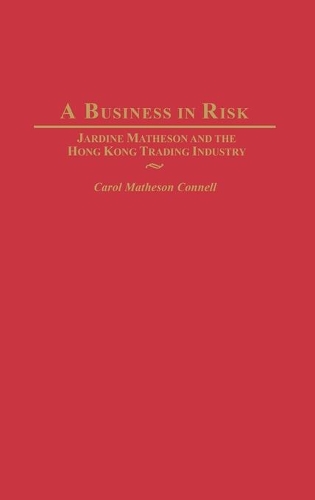
A Business in Risk: Jardine Matheson and the Hong Kong Trading Industry
(Hardback)
Publishing Details
A Business in Risk: Jardine Matheson and the Hong Kong Trading Industry
By (Author) Carol M. Connell
Bloomsbury Publishing PLC
Praeger Publishers Inc
30th May 2004
United States
Classifications
General
Non Fiction
658.155
Physical Properties
Hardback
200
Width 156mm, Height 235mm
454g
Description
Jardine Matheson & Company is perhaps best known through James Clavell's Taipan. The firm played an important role in the founding of Hong Kong, but its growth in the 20th century, through acquisition and divestiture, has never been adequately explored until now. This is not only the first study of Jardine Matheson to systematically uncover the industrial logic of its growth strategy; it is also among the first studies of the Hong Kong trading industry as an adaptive ecosystem based on trade, equity, and debt relationships that reduced business risk. Understanding the experience of Jardine Matheson will prove valuable to anyone who is eager to learn the lessons of adaptation and survival that marked not only the first period of globalization, but its current incarnation as well.
Reviews
.,.".Carol Matheson Conell has done an exceptional job of examining the history of the organization and brings together this history with Penrosean interpretations of the organizations growth in order to add value to readers interested in learning from this book for the readers own organizations. I strongly recommend the book."-Shawn M. Carraher, Director, International Family Business Center; Texas A & M University
.,."brings to life the resource-based theory of the firm using as a case study the historical development of the Hong Kong trading industry, and focusing one of the oldest exemplars, Jardine Matheson & Company....The book contributes to the resource-based literature, to our current understanding of sustainability, and to knowledge of a very important British company and its peers."-Arthur Francis, Professor of Management and Dean, School of Management, University of Bradford
"Changes in technology, changing financial needs, political realignments and changes in wealth and demand were obsolescing existing patterns of business and creating new opportunities. JM, a world-spanning enterprise with few peers, seems to have been keenly adept at exploiting many of them. What were these opportunities Could they recur....The book by Dr. Connell reviews and analyzes these issues at JM, and separates the serendipitous event from the historic lesson. The former is an interesting story, but of limited applicability. The latter is what the inquisitive manager of today's global enterprise may want to study diligently."-Roger Mesznik, Ph.D. Columbia University
"Edith Penrose explained how a firm could grow by expanding its capabilities and finding ways of applying them to new opportunities; she also explained how this growth was shaped by its organizational framework. Alfred Marshall had previously discussed the role of organization, and had drawn attention to the importance of a firm's "external organization" in building both knowledge and markets. Both analyses are beautifully exemplified in this account of a company that was particularly adept at building and using knowledge, and unusually conscious of the basis of its success."-Brian J. Loasby University of Stirling
"This is a perfect book for anyone seeking to understand today's "hot topics" - doing business aroung the world [globalization], interorganizational collaboration and cooperation [strategic alliances], balancing and controlling risk [diversification] - in historcial terms. Carol Connell has done a masterful job of showing that the challenges faced by the modern cooperation in the global economy are, in fact, universal and enduring and that competitive organizations can be "built to last.""-Thomas P. Ference, Ph. D. Professor of Management Columbia University
Author Bio
CAROL MATHESON CONNELL is Assistant Professor of Business and Management, Brooklyn College, the City University of New York. She is a descendant of James Matheson, a co-founder of Jardine Matheson & Company.
